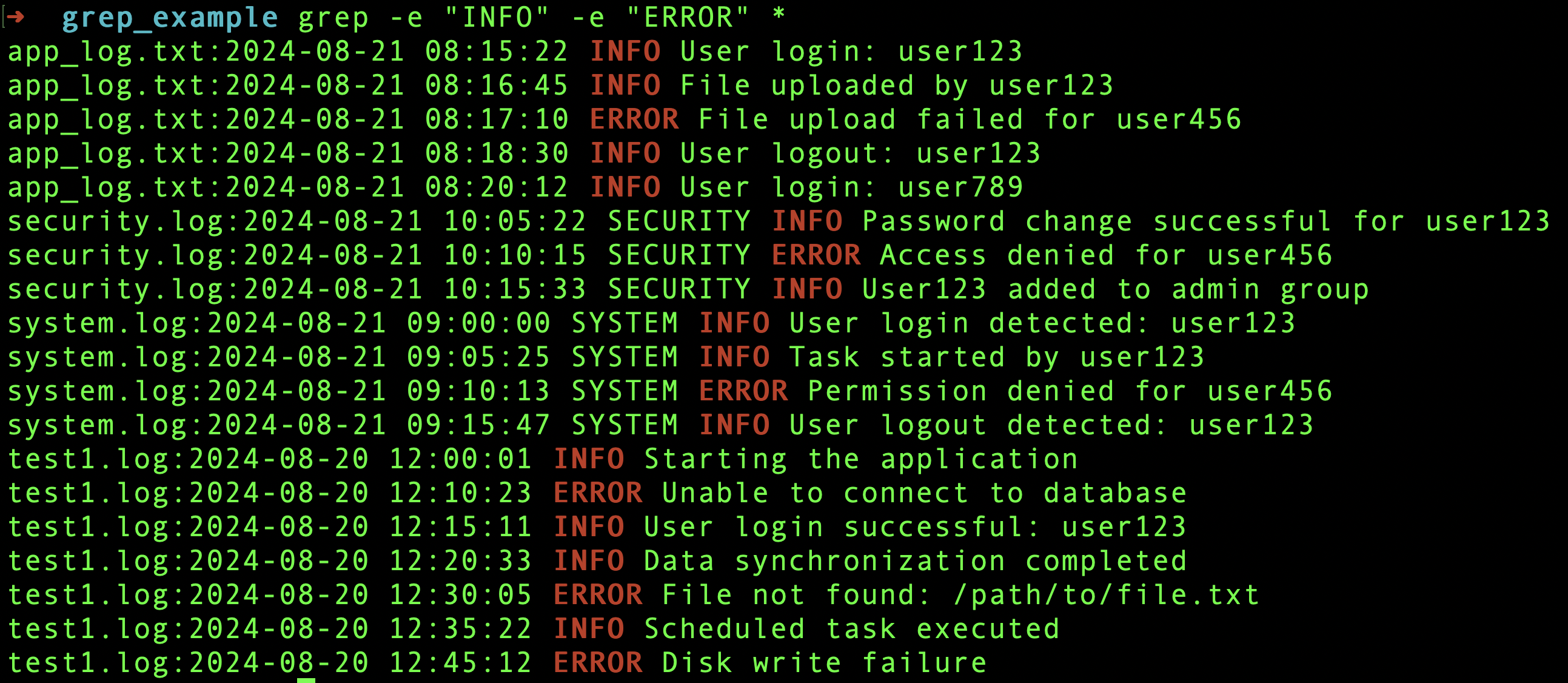Searching text content using linux command
 Asfaq Leeon
Asfaq Leeon
Sometimes we need to search text in log files or command outputs. For example, you may need to search error in production server's log files. Typically those log files size are huge and text editor's can't handle it even if the computer has a standard configuration.
The popular and also the powerful command in linux for searching text is the grep. Let's see how can we use this command for text searching.
Preparing files
I've asked ChatGPT to generate a sample log. I've created a file named test.log and paste the content in that file. Here is the content of generated log by ChatGPT.
2024-08-20 12:00:01 INFO Starting the application
2024-08-20 12:05:45 WARN Low disk space on /dev/sda1
2024-08-20 12:10:23 ERROR Unable to connect to database
2024-08-20 12:15:11 INFO User login successful: user123
2024-08-20 12:20:33 INFO Data synchronization completed
2024-08-20 12:25:47 WARN High memory usage detected
2024-08-20 12:30:05 ERROR File not found: /path/to/file.txt
2024-08-20 12:35:22 INFO Scheduled task executed
2024-08-20 12:40:55 WARN CPU usage high
2024-08-20 12:45:12 ERROR Disk write failure
Syntax of grep
grep [option] pattern [file...]
We can put multiple file names or a single file or a regex pattern of file names or extension like *.txt
Let's find the text user123 from the file test.log
The command is easy, the string is user123 and the only one file that is test.log
grep user123 test1.log
The output is

Notice that search token is in red mark and the matched line is captured.
Search in multiple files
For this part, I've create 4 other log files. Those names are
webserver_access.log
security.log
system.log
app_log.txt
Each contains ChatGPT generated content. Also, you can one file has the .txt extension and other have .log
Now let's search the term user123
grep "user123" *
Here the regex * refers the all files in the current directory The output is

Now, lets filter some file. We want to search in only .log files only not the .txt then

Subdirectories
What if there are subdirectories and there are log file inside those. Then we have to use an option -r. I've moved
grep -r "user123" *.log

Here you can see dir1, dir2/dir3 etc.
Ignoring cases
In webserver_access.log file, I've put some rest api request/response log. The verbs in uppercase. So, if we want to ignore case we have an option -i
grep -i "get" *.log
The output is

Total count
If we want to know only total occurrence count, then we have an option -c
grep -i -c "get" *.log

Line numbers
We may want to know the line number where pattern matched. Then use the option -n
grep -i -n "get" *.log

Here, you can see line 1, 3, 5 after the filename.
Invert search
Means which pattern we've provided the result have anything without the pattern itself. In this case we have to use the option -v

Here, I've defined without 'INFO' print others. There is only line contains which doesn't have the term 'INFO'
Advanced regex
If we have to use complex regex then there are 2 options. One is extended regex-E and another one is pear -P. For example if we want to extract the date-time, we need a complex regex.
grep -E "\d{4}-\d{2}-\d{2}" security.log

Multiple keywords
Use option -e
grep -e "INFO" -e "ERROR" *

Piping
We can use grep with another command using pipe.
curl -X GET https://jsonplaceholder.typicode.com/todos/1 | grep "title"
Redirection
Using redirection operation we can write the search output to another file
grep "GET" webserver_access.log > result.txt
Conclusion
Those are for today. I hope you've learned something from this article. If you like this then you can give me a thumb. Happy coding.
Subscribe to my newsletter
Read articles from Asfaq Leeon directly inside your inbox. Subscribe to the newsletter, and don't miss out.
Written by
